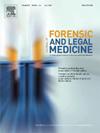哥伦比亚安第斯中部地区不同死因法医血液样本中弓形虫IgG和IgM抗体的流行情况
IF 1.2
4区 医学
Q3 MEDICINE, LEGAL
引用次数: 0
摘要
本研究的目的是双重的:首先,评估能够测量法医样本中抗弓形虫抗体的样本收集方法,其次,报告被送到亚美尼亚、马尼萨莱斯和佩雷拉(哥伦比亚中部安第斯地区的城市)国家法律医学和法医科学研究所西部区域办事处(INMLCF)的交通事故、杀人和自杀导致的死者中抗体的流行情况。方法:首先,我们评估了在滤纸或真空容器管中检测抗体的可行性。收集了15名志愿者的血清样本作为对照,并在室温下两天后将滤纸上抗体的测量与Vacutainer管中收集的相同样本进行比较。随后,从马尼萨莱斯、亚美尼亚和佩雷拉涉及各种死因的法医案件中收集了42份血样。使用Biomerieux®的VIDAS II试剂盒检测抗弓形虫IgG和IgM抗体。结果:志愿者样本在使用滤纸时始终呈阴性,而在Vacutainer试管中收集和死后48小时前则保持阳性。因此,法医样本采集使用真空容器管。在42份法医血样中,19份(45.2%)检测弓形虫IgG抗体阳性。所有样本的IgM抗弓形虫抗体检测均为阴性。观察到抗体阳性与原籍城市之间存在显著关联,而交通事故造成的死亡与弓形虫病呈负相关。结论:我们发现滤纸不适合采集尸体血清学研究的样本。抗体的阳性程度因城市而异,在马尼萨莱斯,交通事故造成的死亡与弓形虫病无关。本文章由计算机程序翻译,如有差异,请以英文原文为准。
Prevalence of IgG and IgM antibodies to Toxoplasma gondii in forensic blood samples from different causes of death in central Andes region in Colombia
Introduction
The objective of this study was twofold: first, to evaluate the method of sample collection that would enable the measurement of anti-Toxoplasma antibodies in forensic samples, and second, to report the prevalence of antibodies in deceased individuals due to traffic accidents, homicides, and suicides who are brought to the National Institute of Legal Medicine and Forensic Sciences, Western Regional Office (INMLCF) in Armenia, Manizales and Pereira, cities located in the center andes region of Colombia.
Methods
Initially, we assessed the feasibility of measuring antibodies on filter paper or in Vacutainer tubes. Serum samples from 15 voluntary individuals were collected as controls, and the measurement of antibodies on filter paper was compared with the same samples collected in Vacutainer tubes after two days at room temperature. Subsequently, 42 blood samples were collected from forensic cases involving various causes of death in Manizales, Armenia, and Pereira. Measurement of anti-Toxoplasma IgG and IgM antibodies was performed using the VIDAS II kit from Biomerieux®.
Results
The volunteer samples consistently tested negative when using filter paper, whereas their positivity was preserved when collected in Vacutainer tubes and before 48 h after death. Therefore, the forensic samples were collected using Vacutainer tubes. Out of the 42 forensic blood samples, 19 (45.2 %) tested positive for IgG anti-Toxoplasma antibodies. All samples tested negative for IgM anti-Toxoplasma antibodies. A significant association was observed between antibody positivity and the city of origin, while deaths due to traffic accidents showed a negative association with toxoplasmosis.
Conclusions
We found that filter paper was unsuitable for collecting samples for post-mortem serological studies. The positivity of antibodies varied significantly depending on the city, and in Manizales, deaths resulting from traffic accidents were not associated with toxoplasmosis.
求助全文
通过发布文献求助,成功后即可免费获取论文全文。
去求助
来源期刊

Journal of forensic and legal medicine
MEDICINE, LEGAL-
CiteScore
2.70
自引率
6.70%
发文量
106
审稿时长
57 days
期刊介绍:
The Journal of Forensic and Legal Medicine publishes topical articles on aspects of forensic and legal medicine. Specifically the Journal supports research that explores the medical principles of care and forensic assessment of individuals, whether adult or child, in contact with the judicial system. It is a fully peer-review hybrid journal with a broad international perspective.
The Journal accepts submissions of original research, review articles, and pertinent case studies, editorials, and commentaries in relevant areas of Forensic and Legal Medicine, Context of Practice, and Education and Training.
The Journal adheres to strict publication ethical guidelines, and actively supports a culture of inclusive and representative publication.
 求助内容:
求助内容: 应助结果提醒方式:
应助结果提醒方式:


